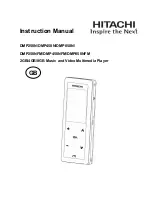
Hookups 9
Determining the best possible connection...
The capabilities of your existing equipment, especially your TV, will determine your connection possibilities.
However, the following guidelines describe which options provide the best picture and sound quality.
Component Video provides the best picture quality.
Details are on page 12.
S-Video provides excellent picture quality.
Details are on page 11.
Composite Video (a yellow Video jack) provides good picture quality.
Details are on page 10.
Your TV may have only an RF-style jack, usually labeled Antenna In or 75 ohm or
RF In.You will need an RF modulator in order to view the DVD Player at your TV.
See your electronics retailer for details on RF modulator availability and
operations.
Digital audio connections provide the clearest sound, but you must have a digital stereo
receiver. Connect either the DVD Player’s COAXIAL or OPTICAL digital audio out jack to
your Stereo for the best sound quality.
Details are on page 14.
If digital connections are not possible, connect the DVD Player’s red and white AUDIO OUT
jacks to the Audio In jacks of your Stereo or TV.
Details are on pages 10-13.
Before you begin...
●
Refer to the manuals of your TV, Stereo, or other equipment as necessary. Note the style of jacks and
connectors on the other equipment. Determine how to choose different Audio and Video In channels
on your other equipment so you can see and hear the DVD Player on the TV, Stereo, etc.
●
Disconnect all equipment from the power outlets. Connect the equipment to the power outlets only
after you have finished hooking up everything. Never make or change connections with equipment
connected to the power outlet.
Remember...
●
Connect the DVD Player directly to the TV. For example, do not connect the DVD Player to a VCR,
then connect the VCR to a TV.This type of connection may distort the picture and sound. Also, your
VCR might have the copy protection system, which could distort the DVD image or prevent playback
of some Discs.
●
Set the TV to the correct Video In channel. Such channels may be called AUX or AUXILIARY IN,
AUDIO/VIDEO or A/V IN, EXT1 or EXT2 or External In, etc.These channels are often near channel
00. See your TV manual for details. Or, change TV channels until you see the DVD screen saver on the
TV.
●
Set the Stereo to the correct channel or “source” mode.
●
Do not connect the DVD Player’s AUDIO OUT jacks to the PHONO IN jack of your Stereo.
●
You only need one audio connection and one video connection between the DVD Player and your TV
and/or Stereo. So, you might not use all the jacks on the DVD Player.
Once you determine the best option, find your choice on pages 10-14. Follow the
steps for the hookup you choose.
MDV450 25/09/2002 9:46 AM Page 9










































